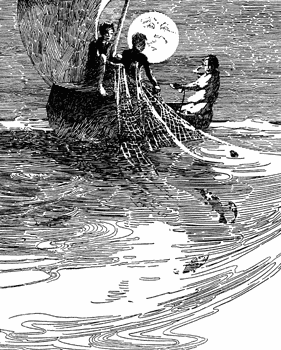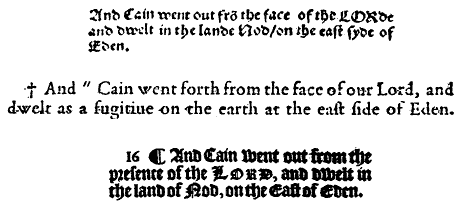This space has of late acquired a complacence with its own axioms and reasons, the comfort born of uncontested familiarity with a stile. The space needs, it thinks me, a little baiting,
ad hominem et ad materiam; and so I jetty forth on a sea of disprizion.
There is a site—let us term it
The Valve, for want of a more fitting moniker—wherein the scholars of divers polytechnics shunt and shuffle about their wits as if at bezique or more royal disports. They vaunt themselves as peacocks yet their words are more convenient to parrots, and these barren nobcocks psittacize and pontificate all puff'd up with fancies not their own. I do confess to perusing when the mood takes me some of the
maniere with which they sow this plot, but in truth, I find it too too oft compassed about with absurdities and trivialities. A late and peculiarly mephitic
exhalation arose from a patch marked,
Joseph Kugelmass, whom I take to be some sort of tropological monster tricked up in the guise of a young man. Hear him ope his maw:
My dissatisfaction with certain prevailing notions about literary criticism reached a boiling point at four in the morning, in a car on the way home from IHOP. It appears that even in a car, traveling at forty miles an hour, full of passengers who are themselves full of pancakes and imitation maple syrup, one is not protected against the following clichés:
What kind of ignobility must a man have in his own soul to produce such shameless blatter? Will he presume to tell us of his revelation, this superior literary man, as arriving in a carload of bobbies farced with ersatz confectionaries at the small hours of morning? Would we trust a philosopher to dine at plastic tables? But speak, Herr Roundmass, speak of your Profundities!
1. The value of Sigmund Freud’s work lies in his influence on certain modernist and post-modernist writers. Of no value in himself, Freud is nonetheless an important historical figure for literary critics.
2. Freud’s theories about the psyche have been thoroughly discredited by modern science, partly because of new data on how the brain works, and partly because of the high failure rate of Freudian therapies in psychiatric clinics. The fact that scholars in English departments continue to accept Freudian “truths” is a sad comment on the insular, pretentious nature of the field.
Blow a man down! One could not be insensible to these reasonings. See how he loads the die, readers—how this Pharaoh among men can punctuate a "truth" out of its worldly environs, and how he indicates with his little Gallicism,
cliché, just how contemptible are these propositions to such a Hercules as himself!
I am inclined to go halfway with both statements. Whatever works best in a clinic ought to prevail there. Although, in my last post, I did link Freud to contemporary neurological theory, such continuities are few and far between.
He gestures, airily.
Furthermore, I am more comfortable using Freud in a paper on Invisible Man than I am applying him to Chaucer.
Another gesture, and a puff of smoke. The crowd gasps.
Nonetheless, the way many contemporary scholars have turned on Freud reveals a flawed ideology at work in their criticism, and also at work in his.
Wait, good sir, don't scoff just yet, for big things are afoot! Now, I must advert my reader that Kugelmass is not the most succinct of writers—he petties himself about with Freud and Dickens and Greenblatt and Marx and other such icons for a goodly number of words. The tenor of his argument appears to be that some entity which he terms "experience", and not some other entity which he terms "explanation", should be the
telos or goal of the literary critic. (Thy pardon I humbly beg, I mean, "literary critic".) The method of a Freud or a Marx, thinks Herr Klugelmass, is "explanation", and by such method are all the fair melodies and gentle temperaments of the maiden Art despoiled. Hark!
Let us consider the proposition that all attempts to explain art take ideas to be art’s most important content.
It is an inconsiderable proposition, but nay, let us consider notwithstanding.
They become Platonic readings, contemptuous of the aesthetic. The aesthetic shows up as a detour that obscures the argumentative core of the work, or else as propagandistic embroidery.
A Platonic reading, sir? I take it you refer to some other "Plato", perhaps some Greek merchant or snub-nosed bank-teller? Surely you have not in mind that most noble of all philosophers, who let fall from his fingers flights of such sublimity as to make all the Muses weep in Arcadia? Surely not that Plato priz'd by all Antiquity as stylist incomparable, whose argument only prospered in the detour of its "aesthetic"—a Platonic mot that,
psyche aisthetike—and in its "propagandistic embroidery"?
But stay, what our interlocutor wishes us to be cognizant of is a certain tendency to systematise, to boil one's literary legumes out of any flavour. Herr Freud (the most famed Platonist who ever did sit in our salons), our booby opines,
quickly reduces Cordelia to a symbol of Death, and makes the Platonic move from the concrete to the purer Idea. In my view, a better reading would preserve Lear’s ambivalent emotions towards a daughter whose very health and good sense are painful reminders of his own failing powers, even as they reflect back to him the best part of his legacy.
Yea in sooth, and a better reading again would preserve each and every part, trope and temper'd word of the Bard's quill—indeed a better reading would be only to rescribe the very
Tragedie of King Lear itself.
William Benzon, a conspirator in this Teuton's troupe, bedizens himself in a comment most uninvitingly with an alamode Borges, and pokes at the intentions of our poor Kugelmass, thus—
Borges’ Pierre Menard rewrote Quixote word-for-word, but the meaning changes because the context does. Are you saying the Quixote critic aspires to capture-invoke-create the very same Quixote-experience, but through different words (and at a different time and place)?
At the very least Mr. Benzon (for I recognise no other appointed title for the man) has seen through his colleague's intentions. Herr K accepts not the 'reductive interpretative [sic] style' of Freud, and worse, of the historicist, but only a new manner of 'treating art as experience'. But what could be intended by such an unlikely and infelicitous concatenation of vocables? Is he perhaps reminded of the vapid exercitations of
Schleiermacher, who burbled of putting himself in the mind of the author or even Author by some Romantic mind-meld? K acknowledges not his compatriot, but he alerts us that his own notion
means accepting that art, like experience, is what it seems to be. Art is its surfaces: it is beautiful at one moment, symbolic the next, and political a moment after that. It is even the retrospective unity that might be achieved between these things.
Puff, thou sayst.
Modernism. An idea as new as the hills. Trust thy instincts, cher lecteur.
The appearance of “depth” that is provided by psychoanalysis, Marxism, or historicism is real for the work in question, but cannot be taken to be definitive.
Puff, thou sighst. A softserve sort of
Postmodernism, a disinclination towards 'grand narratives'.
The observer’s intuition of a beautiful moment, or of a timeless human essence, within the work, is neither conclusive nor epiphenomenal – the two poles to which causal explanations usually assign an artwork’s effects, in imitation of Plato. Nor are ideas the epiphenomenon, and dissymmetry the truth and guarantor of aesthetic quality, as is sometimes argued in critiques of Henry James or Thomas Mann.
Miserabile visu! This man, readers, is a
graduate student. He has
graduated—but from whence, the University of Clowderminds and Bumbleheads? See how lack-a-daisicly he juggles with philosophies, recalling us to our
Papineaux with his talk of the epiphenomena, drizzling his salat with a sprig of token Plato, a
soupçon of recycled modernist conceits—
dissymmetry indeed, what
barbarismos, can't speak English, man? And it being the
truth and guarantor of any deuced thing in the world! It is a hoary thing and a knocklegged one that we entertain such hogswallop in the first place!
Artwork is anti-foundational because it is multiply founded.
O heavn'ly rapture! O archangels tolling from beyond the Empyrean! O winds and oceans churning in the Deep! Stop all clocks, friends, we have struck Gold. Herr K has freed us from our Nibelung fetters, unhappy toilers we on our anvils in the cave of Formalism!
Our prize pilicock wanders dazed and befuddied in similar circumambulations for a quireful of paraphs, groping for meaning, sick with indigestion after swallowing a cartload of the old makers of taste, and for this very reason affording more pleasure to the popcorn-chewer than to the seeker after truth (afflicted creature!). What could be the basis of any reductive meaning? he asks once and again, doling out the same fortuitous drubbing to a passing structuralist or New Historicist. Nevertheless Herr Strudelmass is reticent to offer an alternative in the eyes of those whom he perceives superior still to himself—and let us pray forget those miserably pancaked Marxists sharing automobile space. Neither the "intuition" nor the "ideas" are to be the epiphenomenon, and what next, what next?
There have been very few great artists who did not juxtapose force with closure, and reconciliation. There are moments in the work that reach for the whole, and so there must be a persistent form of criticism to succor those moments.
Which all appears a verily anfractuous way of informing us that these "great artists" possess both
Genius and
Rules, that the greatest revolutionary might also be dyed in the wole a reactionary. Take that,
M. Derrida, o strait-laced rebel! As melancholy closure to his bulletin, Herr Fugelfuss takes us mincing round a Freudian garden prettied up in morals:
It would be highly irresponsible to write historical criticism using Freud, without owning up to our skepticism [sic] about him.
Irresponsible? Accursed goosecap with your foaming cant! Listen rather to your Kant,
Er ist keinen Responsibilität im Kritik. Dost thou even profess this so-named "skepticism"?
Rather than asking, Does psychoanalysis cure schizophrenia?, we should be asking whether we want to continue to inhabit Freud’s world, with its pleasures and terrors, and its relentless quest for a victory over compulsion. I respect Deleuze and Guattari for rejecting that world out of a philosophically considered exuberance. I have not forsaken it yet.
Ah not! What a warm and affective admixture of sentiments! What if I still would fain inhabit the world of
Ptolemy? or
Milton? or
Stephen Jay Gould? Quid tum? So bound by your little nest are you, little bird, and so self-aware! What wonders of autobiography hath this blog wrought? So after strutting about and puffing up your little parrot breast, you have sung not sweetly about that depucelated Muse of yours, Literature. Sooth you have sung of little but your own unsweet song, which
malgré an alamode
Novalis, is poor show in such a climate as yours. Know the Truth, ignoble Bugleboss—your precious books are but playthings to the noble amongst us, but trifles to those Giants with the wit to make grand reductive Schemata, with the mastery to subjoin and entrample the puny neck of Art with the yoke and the boot of Exegesis! They might be well advised to rub salt into the wounds of Romantic turtle-doves, for in fettering Art with their structures, be it Freud, be it Marx, be it the historicists of a latter age, they have set it free—even the feeblest of poets knew it!
We sing in our chains like the sea
These critics, o most unpoetic lad, these are the chaunters and the poets of our age, for they have made magic and wonder out of an idler like Shakespeare, and they teach us the theurgy that makes statues of men—and also the goety of words.









 I don't recall the specifics now. But it must have involved elementary formula-plugging and vector-resolution, always the dullest part of mathematical physics. Anyway, there is one thing that you must remember when working on circular motion—the direction of velocity is not the same as the direction of acceleration. In this case, the latter is just straight down with gravity (M), while the former is tangential to the plane of the igloo—here marked with a dotted line, the resolution of the gravitational force and the force of the surface against the ball.
I don't recall the specifics now. But it must have involved elementary formula-plugging and vector-resolution, always the dullest part of mathematical physics. Anyway, there is one thing that you must remember when working on circular motion—the direction of velocity is not the same as the direction of acceleration. In this case, the latter is just straight down with gravity (M), while the former is tangential to the plane of the igloo—here marked with a dotted line, the resolution of the gravitational force and the force of the surface against the ball.



 As
As 









